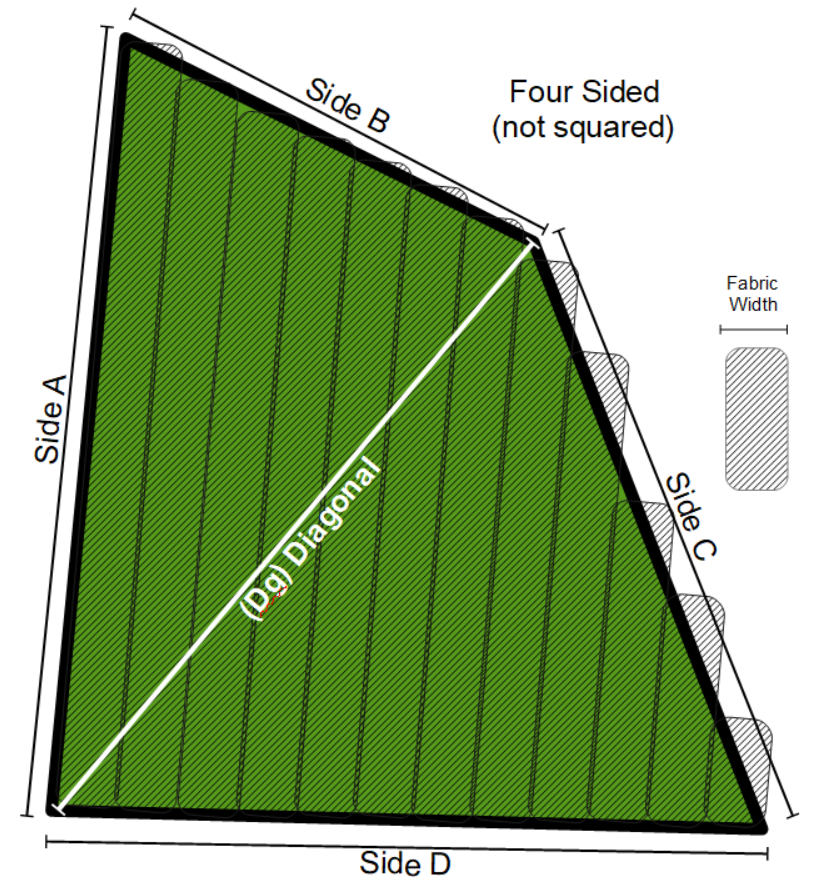The Landscape Fabric Calculator has twenty functions and data items to compute the amount of landscape fabric needed to cover different shaped area and estimate the cost.
Landscape Fabric Calculators
The Landscape Fabric Calculator suite has data and calculators associated with the purchasing and use of landscape fabric used in many lawn and garden applications. The calculator includes the following functions:
- Landscape Fabric for Rectangle Area: Computes the number of rolls of landscape fabric need to cover a rectangular area such as a garden or planter based on the area's length and width and the length and width of the fabric in the rolls.
- Landscape Fabric for Non-squared Four Sided Area: Computes the number of rolls of landscape fabric need to cover a four sided (non-squared) area such as a garden or planter based on the area's length of sides, the length of a diagonal and the length and width of the fabric in the rolls.
- Landscape Fabric for Five Sided Area:
Computes the number of rolls of landscape fabric need to cover a five sided area based on the area's length of sides, the length of two diagonals and the length and width of the fabric in the rolls.
Landscape Fabric Price Survey
Landscape Fabric Price Survey provides a data point of product pricing. Pricing information is for convenience only, and there is no stated or implied guarantee that the products will be available at these prices in your area. ALWAYS use local price information.
Landscape Fabric Price Survey
- Retailer: Menards
- Survey Date: 5/21/24
- Survey Sample Size: 8
- Survey Prices:
- Premium Product: 3'x50'
- Price: $24.0
- Price per Square Foot: $0.17
- Mid Product: 3'x100'
- Price: $24.99
- Price per Square Foot: $0.08
- Low Product: 4'x80'
- Price: $16.84
- Price per Square Foot: $0.05
- Premium Product: 3'x50'
These numbers were compiled using the Length Width Price Survey Tool and the Landscape Fabric Raw Price Data.
CAUTION: The pricing information provided is for calculating convenience with NO implied guarantees to the accuracy of the values listed. Authoritative sources should be sought to confirm any value before risking health or wealth on the veracity of the data. Furthermore, Calc gives no guarantee that you will be able to buy products at listed prices or even if they will be available. The data provided is purely a convenience for making estimates, so we repeat, ALWAYS use local pricing and authoritative specifications.
Landscape fabric Information
Landscape fabric is a cloth (textile) material used in gardening and landscaping. It's primary purpose it create areas of no plant growth except where the fabric is cut and specific desirable plants are planted. In this way, undesirable plants including weeds are block from growth by being denied sunlight. Since it is a fabric, landscaping fabric is subject to being blown away by wind until something heavy is on it, like decorative stones, or until fixed to the ground using garden staples. Southwest Boulder & Stone (75 and 500 pack) and Vigoro (100 pack) are to manufactures of garden staples.
Landscape fabric comes rolls of various sizes. A recent survey showed the following size options.
| Size | Manufacturers | Size | Manufacturers |
|---|---|---|---|
| 3' x 24' | Vigoro | 4' x 300' | Agfabric, Sunnydaze Decor, RSI, DeWitt |
| 3' x 25' | Sta-Green | 5' x 50' | Agfabric |
| 3' x 40' | Sta-Green | 5' x 100' | Agfabric |
| 3' x 50' | Agfabric, Vigoro, Southwest Boulder & Stone, Scotts, Sta-Green, SYNLawn, VEVOR, DeWitt, Jobe's | 5' x 250' | DeWitt |
| 3' x 100' | Dalen, Vigoro, AgFabric, VEVOR, Sta-Green, RSI, DeWitt, Jobe's, Yard Elements | 80" x 80" | Easy Gardner |
| 3' x 150' | RSI | 6' x 12' | Agfabric |
| 3' x 200' | Sta-Green | 6' x 50' | Agfabric, Sta-Green, DeWitt, RSI |
| 3' x 250' | DeWitt, Sunnydaze Decor | 6' x 100' | Landmaster, Hanes, Mutual Industries, RSI, Agfabric, Southwest Boulder & Stone, ProMatt |
| 3' x 300' | VEVOR, Sta-Green, Southwest Boulder & Stone, DeWitt, RSI | 6' x 150' | RSI |
| 3' x 330' | Agfabric | 6' x 250' | VEVOR, DeWitt |
| 3.33'x36' | Jobe's | 6' x 300' | VEVOR, DeWitt, Mutual Industries, RSI, ProMat |
| 40"x36" | Vigoro | 6' x 330' | Agfabric |
| 4' x 12' | Agfabric | 6' x 500' | DeWitt |
| 4' x 50' | Vigoro, Sta-Green, Scotts, Sta-Green, DeWitt, RSI | 6.5' x 300' | VEVOR, Agfabric |
| 4' x 100' | Vigoro, Landmaster, VEVOR, Sta-Green, Agfabric, DeWitt, RSI, Sunnydaze Decor, Black Knight | 72" x 3600" (6'x300') | Dewitt Company |
| 4'x112.5' | DeWitt | 7.5' x 100' | ProMat |
| 4' x 150' | RSI | 12' x 250' | DeWitt |
| 4' x 200' | Vigoro, Black Knight | 12.5' x 54' | Mutual Industries |
| 4' x 225' | Mutual Industries | 12.5' x 360' | Mutual Industries |
| 4' x 250' | DeWitt, VEVOR | 15' x 20' | VEVOR |
